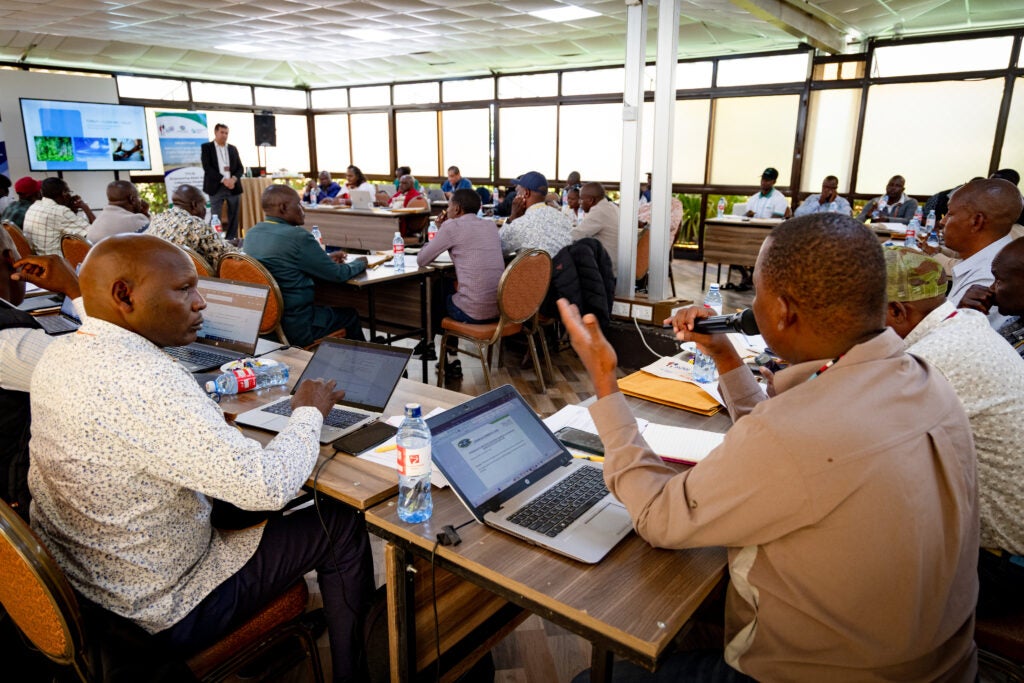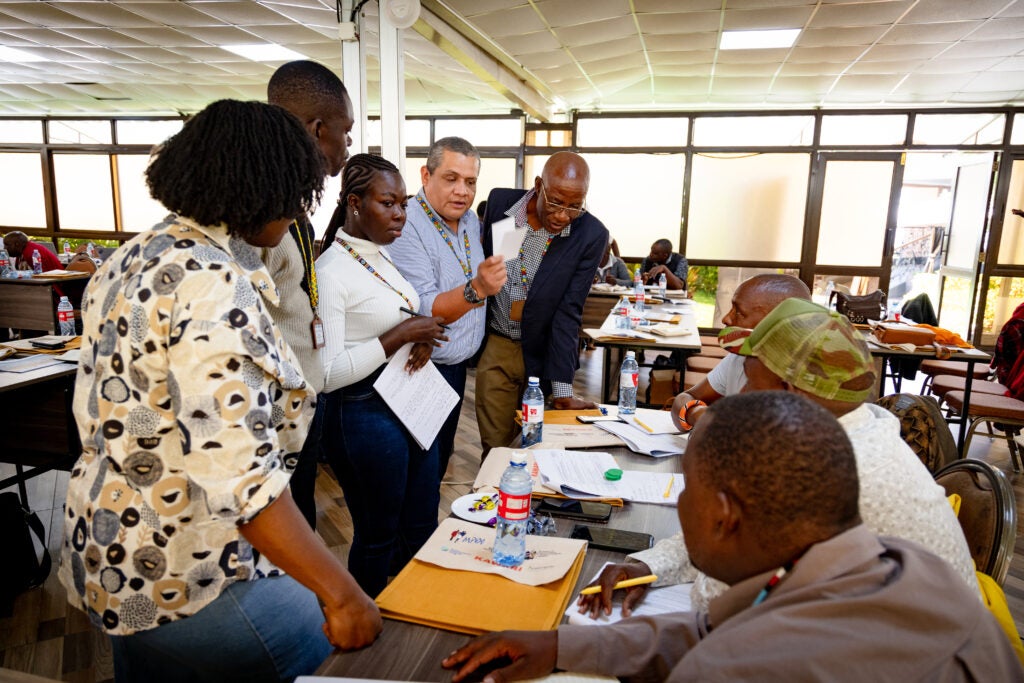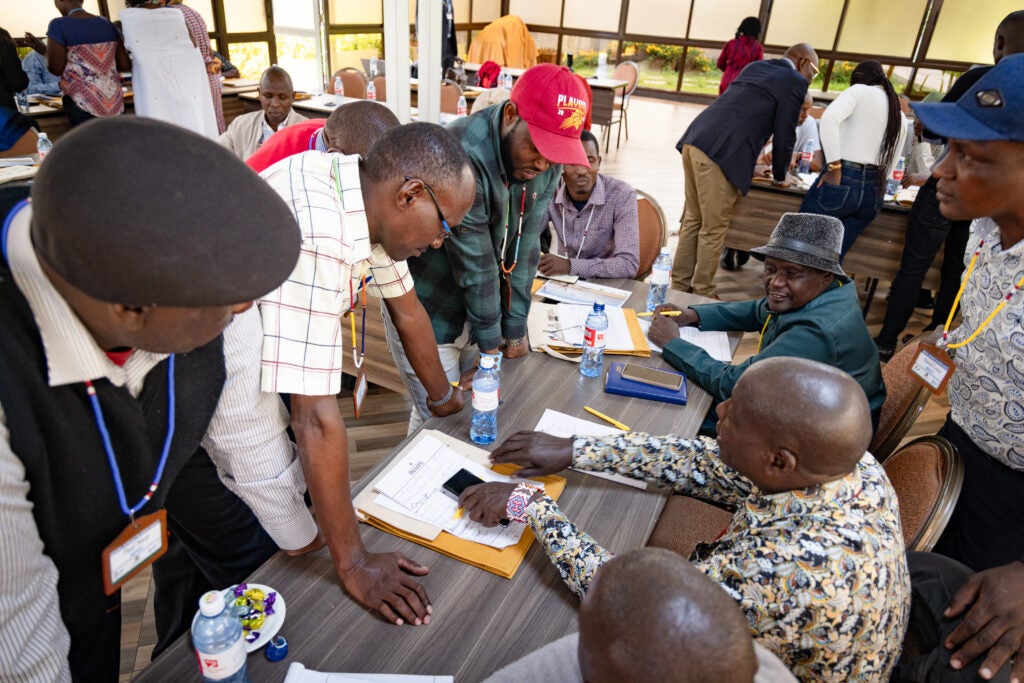
Participants at a carbon markets workshop in Nairobi, Kenya. Facilitators walk through carbon market principles, empowering Indigenous People and local communities to advocate for their rights and interests. Photo by Diego Acosta-López/EDF.
Last week, Environmental Defense Fund (EDF), in partnership with the Kenya Wildlife Service, MPIDO, and IMPACT, convened a transformative workshop in Nairobi that brought together government officials and representatives from Indigenous Peoples and local communities (IPLCs). The event marked a significant step forward in fostering meaningful dialogue, co-learning, and collaborative planning as Kenya positions itself within the evolving carbon market space.
This workshop equipped IPLC leaders with essential tools and knowledge to effectively engage in carbon markets, ensuring their rights are upheld and that they can benefit equitably from Kenya’s climate initiatives. EDF specialists led sessions on the fundamentals of carbon markets, robust monitoring and reporting systems, and the critical roles that both IPLCs and government institutions play in shaping a fair and inclusive market framework.
By the conclusion of the workshop, participants had collaboratively drafted a preliminary roadmap for IPLC engagement in Kenya’s carbon markets. This roadmap includes strategies for equitable benefit-sharing, participation in decision-making, and adherence to social and environmental safeguards.
Why this workshop came at a critical time
Kenya is at a decisive point in its climate leadership journey. In 2023, the country passed amendments to its Climate Change Act (National Assembly Bill No. 42), laying the legal foundation for participation in international carbon markets. The new framework enables Kenya to engage in bilateral carbon trading as well as global mechanisms under the Paris Agreement. In the same year, Kenya also signed a Letter of Intent (LOI) with the LEAF Coalition, signaling its commitment to pursue high-integrity carbon finance solutions that support forest conservation.
These policy shifts have generated growing interest among IPLCs, who recognize the potential of REDD+ and other climate finance mechanisms to contribute to sustainable development. However, they also raised important questions about rights protections, cultural preservation, and the long-term implications of these initiatives on traditional land-use systems.
The Nairobi workshop served as a foundational moment to ensure that IPLCs are not only well-informed but are active co-creators in the development of Kenya’s carbon market strategies.
What we heard: Lessons from IPLCs on rights, safeguards, and participation
A powerful message that emerged throughout the workshop was the depth of IPLC understanding and concern regarding social and environmental safeguards. Indigenous leaders consistently emphasized that carbon market initiatives must not come at the cost of their cultural heritage, traditional knowledge, or self-determination.

A moment of exchange between government officials and Indigenous People and local community representatives during a workshop in Nairobi, Kenya focused on equitable carbon finance. Photo by Diego Acosta-López/EDF
As Mali Ole Kaunga, Director of IMPACT, stated: “VCMs [voluntary carbon markets] could be a risk of IPLCs losing our connection with the land and our territory. That is why we have to develop our capacities to fully understand how IPLCs can effectively participate in VCMs.” This sentiment echoed throughout the discussions, underscoring the need for capacity-building that empowers communities to navigate complex carbon finance landscapes on their own terms.
IPLC participants also demonstrated a keen interest in understanding how carbon projects might impact their livelihoods, forest conservation practices, and spiritual and cultural ties to the land. One woman leader made a compelling point: “No one has to be left behind. Women, youth, elders—we all have to be informed and included in decision-making to participate in VCMs.” This call for inclusive engagement resonated across participants and highlighted the need for gender and generational equity in climate decision-making.
A broad-based collaboration with long-term goals
The workshop brought together a diverse group of stakeholders—including local Indigenous organizations, government agencies, and international partners like the Kawari Fund and the LEAF Coalition—to engage in open and constructive dialogue. This collaborative effort reinforced the importance of cross-sector partnerships in building inclusive carbon market systems that reflect the priorities and perspectives of all actors involved.
The outcomes extended far beyond technical training. The workshop laid the groundwork for a sustained partnership between IPLC leaders and government institutions—one rooted in mutual respect, transparency, and the integration of Free, Prior, and Informed Consent (FPIC) principles into Kenya’s climate policy architecture.
Looking ahead: Building a more equitable carbon market
EDF’s engagement in this workshop reflects a broader commitment to advancing climate action that is inclusive, sustainable, and community-led. Protecting forests and reducing emissions are critical goals, but they must be achieved in ways that respect Indigenous rights and empower the communities who have long been stewards of these landscapes.
As Kenya continues to develop its carbon market infrastructure, the insights shared in Nairobi will help shape a future that is not only climate-resilient but socially just. The workshop highlighted how governments, civil society, and Indigenous Peoples can come together to co-create solutions—and it offers valuable lessons for countries around the world seeking to build high-integrity, inclusive carbon markets.










